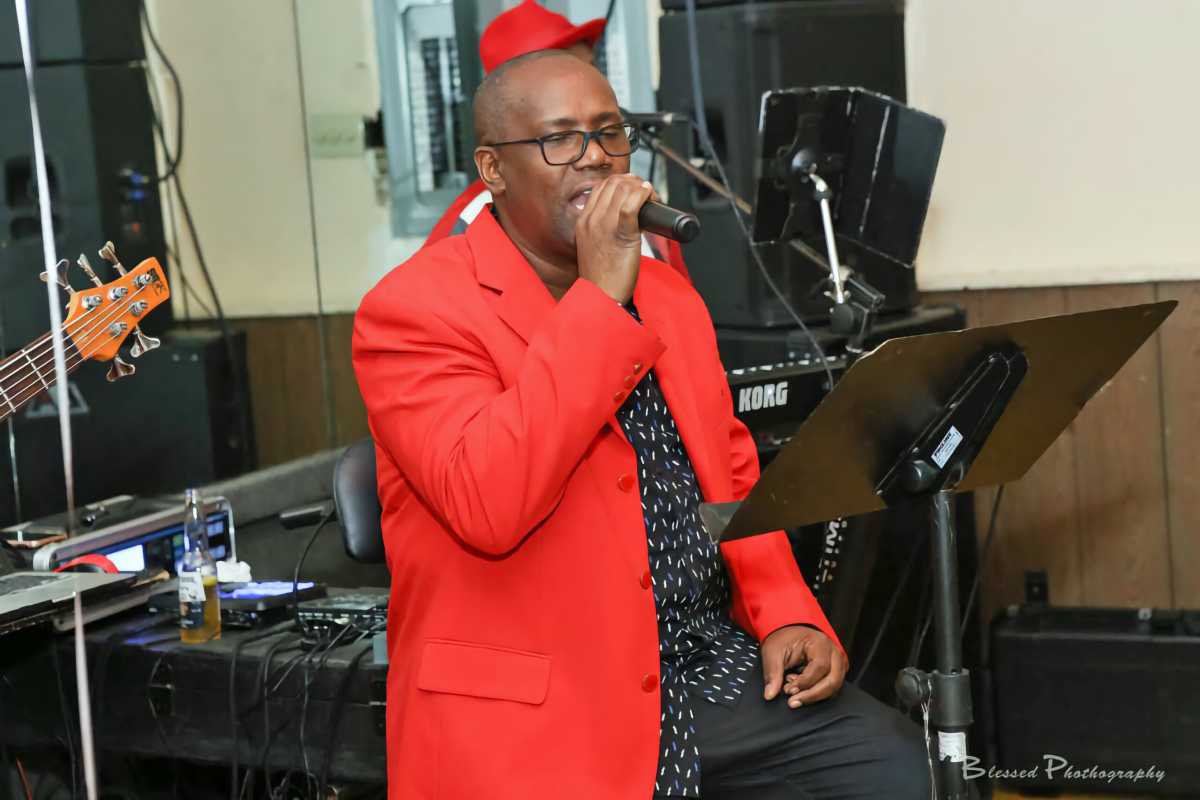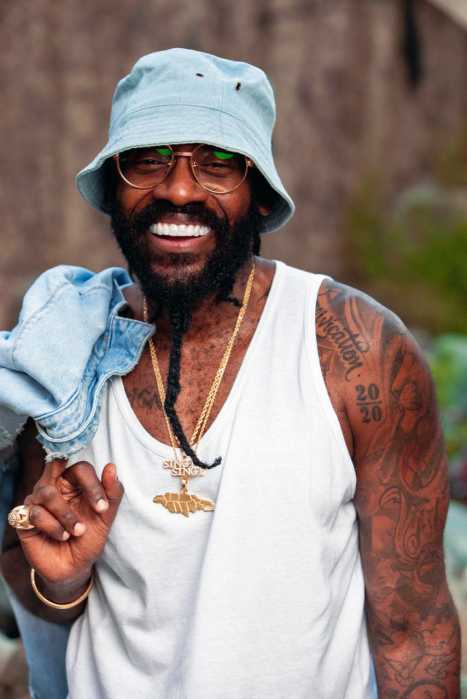“I have often thought that maybe I should not be involved in the entertainment industry, because, in all honesty, I do not particularly like to talk about myself. Weirdly enough, I am a shy person who avoids speaking about himself at all costs. Now, to answer your question as to how a shy person ends up involved in the entertainment and education fields, my only response is, ‘I don’t know’,” Trinidadian Richard Burton, lead singer and sound engineer with the Brooklyn-based Caribbean musical band Tribal Legacy, told Caribbean Life exclusively over the Christmas weekend.
Burton — a Brooklyn resident, who also teaches public school in Staten Island and has been with Tribal Legacy for 21 years — said he was born at Augustus Long Hospital, Pointe-a-Pierre, Trinidad and Tobago in 1967.
He said his parents “must have been great fans of either Richard Burton or Elizabeth Taylor because, growing up, I was teased relentlessly for having the same name as someone I had never heard of before.
“Later, when I realized that I bore the name of a famous, deceased celebrity, I embraced it and made jokes about it whenever people felt the need to state the obvious,” Burton said. “Even when I met The Mighty Sparrow for the first time, he asked me about Elizabeth Taylor’s whereabouts while laughing heartily.”
Burton said his musical journey started during his childhood years in church and in elementary school.
“Growing up in the 70s was fun, but woe be unto any child who displayed any modicum of performance talent, be it singing or dancing,” he said. “From as far back as I can remember, I was always asked to sing, and sometimes dance, for visitors at Christmas, at weddings, at christenings and at many other neighborhood functions.
“In all honesty though, I feigned not liking the attention I received,” he disclosed. “I reveled in it, and I even saw myself ‘making it big’ in music.”
Burton said he participated in singing competitions and other musical shows in secondary school, and, at Cowen Hamilton Secondary in Trinidad and Tobago, he said he “managed to capture the calypso crown in 1982.”
Later, at St. Stephen’s College, also in Trinidad and Tobago, he said he “managed to capture the Calypso crown in 1986 during my final year of A-levels (British external examination).”
At St. Stephen’s, Burton said he sang baritone in the school’s choir, led by Yvonne Suite.
“I will forever be grateful to Mrs. Suite for harnessing and developing my love of singing,” he said. “Mrs. Suite took me once to audition for a TV show called Teen Talent. The show’s host, Hazel Ward, basically said that I was not a good singer and dismissed me.
“It really didn’t bother me because, for all the years I watched that show on television, I rarely saw teenagers who looked like me or who came from a rural community like me,” he added.
Burton said he started to DJ in parties at 16 even while he was still in secondary school.
In addition to playing and mixing records, he said he “used to chant, rap and sing over the PA system, which always seemed to please the party audiences, and worked for Dibbles Production as the head disc jockey.
Button said he continued as a DJ until 19. In early 1987, he said he was DJ’ing set at a party when Andy Joseph who was then the leader of the band Earforce heard him on the microphone.
“He told me that he was looking for a singer for his band, and he asked me if I ever thought about being a frontline singer,” he said. “I had never seen myself as a band singer, and I also thought of it as a bit corny.
“However, Dibbles, Christopher Marcano, younger brother of late calypsonian Lord Superior, encouraged me to try,” he added. “I, therefore, auditioned the next day. Andy and the other members liked what they heard, and they hired me as a lead singer for the band. They really liked the fact that I seemed to be able to sing anything from reggae to soca to R&B with a fair degree of balance, unlike many other vocalists they knew who could only sing one, maybe two types of music.”
Burton said he was “always good” with R&B, classical, pop, calypso, reggae and dancehall, but added that soca was “a different animal altogether.”
He said he studied the great band lead singers of the day, such as Leon Coldero, Carl Jacob, Steve Sealey and David Rudder; and, after a while, he said he developed his own style.
Burton said Earforce took him to parts of Trinidad and Tobago that he had never seen before, and travelled with the band in late August 1987 to perform for Labor Day weekend parties.
But he said Earforce folded up in 1988, when Andy joined forces with Cliff Harris to create Atlantik.
Burton said he was not considered for a job in that band, because he was a second-year student at the University of the West Indies (UWI).
“Andy wanted me to be a member of the band, but Cliff was adamant that he wanted musicians who could give 100 percent commitment to music which, was simply something I could not do at that point in my life,” he said.
Burton said he joined Fireflight in 1989 while still a student at UWI, working alongside Marvin Lewis.
But his stint with Fireflight didn’t last very long, because the band broke up shortly after carnival 1990.
However, during the 90s, Buton said he worked with Volt Express, his own band Aktiv, and also did a few gigs with Traffik, KC and the internationals, and Atlantik.
Burton said the highlight of his musical career in the 90s came when Aktiv “held its own” against Traffik at Harvard Club in Port-of-Spain, the Trinidad and Tobago capital, in November 1996.
“We were basically an unknown band and the consensus among the press, promoters, and party goers alike was that we outplayed Traffik,” he said.
However, Burton said he dropped from his high “like a rock” in the following weeks, because Aktiv never got another job.
He disclosed that 1997 was one of the worst Carnival seasons he had ever experienced as a musician.
He said he had written and recorded a song called “Street Party” for the season, but it was shelved very early by one of the owners of “one of the most popular and powerful radio stations in Trinidad and Tobago.”
“This guy prided himself a singer, and he saw my song as a threat,” lamented Burton, stating that, later in 1997, he “had to end up closing shop on AKTIV because it is very difficult to sustain the interest of musicians in a band that is not working.”
He said he quit music altogether and decided to focus on his main job as a teacher and his side job as an electrician. He had already been teaching for seven years at his alma mater Cowen Hamilton Secondary, where he taught Spanish and English “to some great students.”
In 2001, Burton said he migrated to New York to teach Spanish at the high school level.
One night, in early 2002, he said was at a party at The Ark in Brooklyn, and ran into Trinidadian entertainer KC.
About a week later, Burton said he received a phone call from Owen Romeo, otherwise known as “Dynomite”.
“He said that he ran a band called Tribal Legacy, and KC told him I was looking for a job as a singer,” he said. “He also said that KC told him how great of a singer/entertainer I am, and he would really like to meet me.
“We met, and, later that week, I accompanied them to a gig in Port Jefferson, Long Island,” Burton added. “We have had great success on the restaurant and party circuit. We have performed in several states from New York to Massachusetts to Connecticut to Maryland to Nevada, and Pennsylvania just to name a few. We have performed at private parties, and public events both big and small for people of all races and from all walks of life.
“Over the years, I also found out that I really enjoy playing Caribbean music for non-West Indian audiences,” he continued. “They often shock me with their knowledge of our music, as well as their willingness to embrace our Caribbean culture.
“I love playing music for Caribbean people,” he said. “I like to think that my audience and me are constantly engaged in a musical mutually parasitic /symbiotic relationship. In other words, I feed off their energy just like they feed off mine. I have often been told that one of my strongest features as a frontline singer is my ability to get people involved, as well as say spontaneous things that make people happy.”
Burton, who has two post-graduate degrees, said performing live with Tribal Legacy and other bands has been “quite an experience.”
“Nevertheless, I do sometimes regret not having done more recordings over the past 36 years,” he said. “I must have recorded only about six or seven songs during my time as a singer, but nothing has ever had any real commercial success.
“I have done many great shows with Tribal Legacy over the years and, for the most part, it has been a fun experience,” Burton added. “These days however, I am trying to focus just as much on developing my sound engineering skills.
“Sound engineering has made my life very easy at Curtis High School, where I work as a Spanish teacher,” he continued. “I set up and mix sound for all school events, from the school plays to outdoor concerts, to events in the cafeteria and in the gymnasium. Sound engineering elevated me to the position of auditorium manager.”
After all these years, Burton said he also still DJs, and added he only has two regrets when it comes to music.
“My first regret is that I never learned to play an instrument or even read music,” he said. “All my children can read music, and they play instruments. At least two of them play multiple instruments. Perhaps I should have done so in my early life, but between school and singing, I just never made the time. I regret this because I believe that I would have been a much better singer and songwriter. The late great Lord Kitchener gave me that advice back in 1990 and I never heeded.
“My second regret is one to which many musicians can relate,” he added. “My love for music has truly robbed me of time I should have spent with my family. I can’t begin to recall how many family events I had to cancel or neglect for the sake of some gig or other. I must live with that regret since my children are mostly adults in their 20s and 30s, so it is a bit late to ‘make memories’ as they say.
“That is the story of Richard Burton, husband, father, teacher, singer, sound engineer, DJ, and electrician,” Burton continued. “I hope you enjoyed reading because I really enjoyed telling it to you.”



























